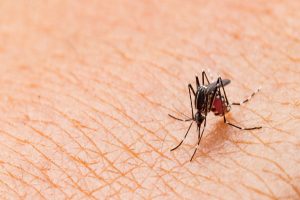Why Do Mosquitoes Bite People?
Unlike other biting pests, mosquitoes do not bite as a defense mechanism. They bite to retrieve the nutrients found in our blood, which are essential for the development of mosquito eggs. After a female mosquito bites you, it is able to then reproduce. Male mosquitoes, on the other hand, do not bite.
When a female mosquito “bites”, it is actually piercing your skin with its needle-like proboscis. The proboscis contains two tubes, unlike just the one found in a hypodermic syringe. One of these tubes injects saliva that contains a mix of chemicals to reduce pain, thin your blood and prevent it from clotting. The other is used to suck up the blood. Blood is not transmitted back into you during the bite process.


